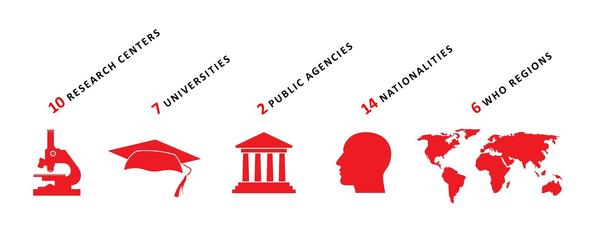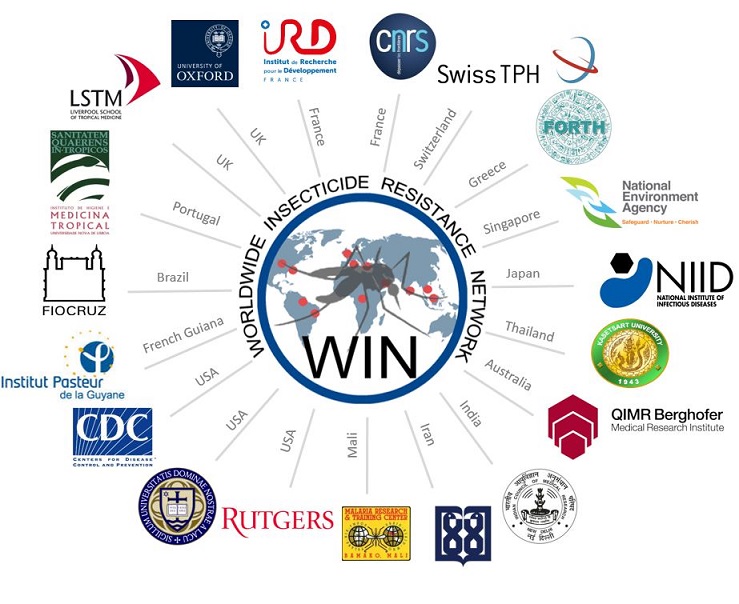Search Results : ""
101 Resultats
Donors
Pertinence: 100 %
TDR , the Special Programme for Research and Training in Tropical Diseases, is a global programme of scientific collaboration that helps facilitate, support and influence efforts to combat diseases of poverty. It is hosted at the World Health Organization (WHO), and is sponsored by the United ...
Expertise
Pertinence: 100 %
The WIN has contributed to a number of technical reports for the WHO to improve vector surveillance and control.
Workshop & meeting
Pertinence: 100 %
The WIN contributed to the organization of a number of scientific events and international workshop to raise awareness, share knowledge and identify research priorities for the control of insecticide resistant mosquitoes.
Standard Operating Procedures (SOP)
Pertinence: 100 %
The WIN contributed to the development of a number of test procedures for monitoring insecticide resistance in mosquitoes and sandflies.
Publication
Pertinence: 100 %
WIN publication Second WIN International Conference on "Integrated approaches and innovative tools for combating insecticide resistance in vectors of arboviruses", October 2018, Singapore. V Corbel, C Durot, N Achee, F Chandre, M Coulibaly , JP ...
Contact
Pertinence: 100 %
Dr. Vincent Corbel Research Professor at IRD-MIVEGECVisiting Professor at IOC-FIOCRUZ, Rio de JaneiroPrincipal coordinator of WINSA vincent.corbel@ird.fr Dr. Ademir Jr. Martin s Investigador en Salud Publica em IOC-FIOCRUZVice-director de Educación, Información e ...
Donors
Pertinence: 100 %
CDC is the nation’s leading science-based, data-driven, service organization that protects the public’s health. For more than 70 years, CDC put science into action to help children stay healthy so they can grow and learn, help families, businesses, and communities fight disease and stay strong; and ...
Governance
Pertinence: 100 %
The coordination of the WIN is made by
Dr. Vincent CORBEL
- Research Professor at IRD-MIVEGEC
- Visiting Professor at FIOCRUZ, Rio de Janeiro
- Principal coordinator of WIN ( vincent.corbel@ird.fr )
Dr. Jean-Philippe DAVID
- Senior researcher at CNRS-LECA
- Co-Principal coordinator of WIN
WIN Project Office
MIVEGEC - Centre IRD de Montpellier, 911 Avenue Agropolis, 34 394 Montpellier – France
Contact us > winprojectoffice@ird.fr
Tel : +33 (0)4 67 41 -- --
The WIN project office
Pertinence: 100 %
The coordination of the WIN is made by Dr. Vincent CORBEL - Research Professor at IRD-MIVEGEC - Visiting Professor at FIOCRUZ, Rio de Janeiro - Principal coordinator of WIN ( vincent.corbel@ird.fr ) Dr. Jean-Philippe DAVID - Senior researcher at CNRS-LECA - Co-Principal coordinator of WIN WIN ...
External Advisory Board
Pertinence: 100 %
The External Advisory Board (EAB) is composed of 2 WHO representatives (NTD and TDR) and is in charge of the follow up and evaluation of the project. Dr Florence Fouque is a medical entomologist who has led more than 30 research projects in Africa and South America to improve the control of vector ...
The Network
Pertinence: 100 %
The WIN is bringring together 19 internationally recognized institutions in vector research , providing a unique framework for tracking insecticide resistance in mosquito vectors of arboviruses around the world. The network aims at identifying the particular countries/regions where resistance could challenge vector control interventions and to provide the WHO and member states with key recommendations for improvement of insecticide resistance surveillance and deployment of alternative vector control tools.
It was initiated by TDR , the Special Programme for Research and Training in Tropical Diseases, in coordination with the World Health Organization’s Neglected Tropical Diseases Department. It is led by the Institut de Recherche pour le Développement (IRD) based in Montpellier, France and the Centre National de Recherche Scientifique (CNRS) based in Grenoble, France. It involves initially 16 research institutes located in each of the five regions of the World Health Organization (WHO). Six partners are based in low- and middle-income countries (French Guiana, Iran, Thailand, India, Brazil, Mali). The teams provide a deep range of experience in medical entomology, vector biology and control, insecticide testing and evaluation, insecticide resistance, population genetics, geographical information systems and remote sensing, and genetics and molecular biology.
19 research partners across the world including 6 Low- and Middle-Income Countries, LMICs (Brazil, French Guiana, Iran, India, Mali, Thailand) with complementary expertise in insecticide resistance (from vector biology and control to resistance diagnostic tools and spatial modeling).
Objectives
Pertinence: 100 %
The WIN's goals are in line with the Sustainable Development Goals (SDGs3) and the Global Vector Control Response (GVCR) adopted at the WHO assembly in 2017 in order to reduce the burden of vector-borne diseases through better management and control of insecticide-resistance mosquitoes.The global ...
What we do
Pertinence: 100 %
Identify areas where resistance challenges vector control and where resistance is under-reportedSpecifically, the WIN identified the “hotspots” of insecticide resistance in dengue and other arboviral diseases and has developed centralized database and comprehensive maps of the levels and mechanisms ...










